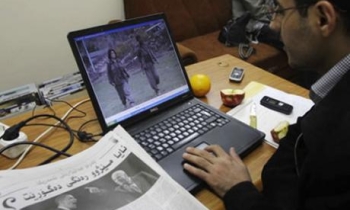The owner-editor of a weekly in a remote town in Colombia has suspended publication of his newspaper and has been forced to flee the region after receiving death threats, probably from right-wing rebels.

Reporters sans frontières (RSF) voiced concern Monday about the fate of Diro César Gonzáles, the owner- editor of La Tarde in Barrancabermeja (in the northeastern department of Santander), who has shut down his newspaper and fled after receiving death threats.
"Like Gonzáles, eight other Colombian journalists were last year forced to stop working and flee their home region, or the country," RSF said. "It is becoming impossible for journalists to work in Colombia's war zones." The organisation said, "We are especially worried to learn that a blacklist put out by the rebels, with the names of Gonzáles and other department of Santander journalists, has been circulating since the end of last year, and we again urge the Colombian authorities to pursue their attempts to demobilise the armed groups."
According to RSF, two men on a motorcycle went to the Gonzáles family home on January 17 and asked to speak to Gonzáles. His wife, Tatiana Sánchez, who also works at the newspaper, told them he was not there. After muttering something incomprehensible, they left. Sánchez noticed that one of the men was armed and she recognised the other as someone who had been accused of involvement in the murder of his wife in a local discotheque on December 23. The latest issue of La Tarde had details of the murder along with photos of the suspects, who had been arrested.
Gonzáles has received threats in the past and has never been too concerned, even when his name and those of two other local journalists appeared late last year on a blacklist that is reportedly still circulating in the department. But then, at the end of December, two men on a motorcycle were repeatedly seen driving around the neighbourhood where La Tarde is located and they went to Gonzáles' home where they told his wife that the order had gone out for her husband to be killed.

Acording to the Committee to Protect Journalists (CPJ), González said he lodged a police complaint about the threats. He and his wife left for Bogotá Wednesday last with the help of local authorities, the Colombian Ministry of the Interior, and the Fundación para la libertad de prensa (FLIP), a local press freedom group. Publication of La Tarde was indefinitely suspended.
"It's outrageous that violent elements in Santander believe they can make open death threats with impunity. We urge the authorities to take these threats seriously and to bring those responsible to justice," CPJ Executive Director Ann Cooper said. "We're alarmed by this pattern of intimidation so close to the May 2006 election when access to independent information will be crucial."
Threats have also been made recently against other journalists in the department of Santander, including Alvaro Pérez Vides, the managing director of the TV station Telepetroleo, who was also forced to leave Barrancabermeja, RSF said.
On January 6, 2006, radio journalist Antonio Colmenares received a death threat after reading a military press release on-air. The unidentified aggressor, having taken offence at the announcement, arrived at Colmenares' place of work, the radio station "La Poderosa", where he insulted the journalist and issued a death threat, according to FLIP and the international Freedom of Expression Exchange (IFEX)..
The incident occurred in the municipality of Pitalito, in the southern Colombian department of Huila. The day before, during a news broadcast the journalist had read an official communiqué regarding a raid during which stolen goods had been found and a suspect captured. The suspect, upon being released a few hours after the news broadcast, was the individual who approached the station to rebuke the journalist for having tainted his reputation.

The journalist explained that he had merely read a press release issued by the army, and thus it was from that source that the aggrieved individual should seek an explanation. He added that the station's microphones were available to the individual if he wished to respond to the information released by the army.
The unidentified individual responded to Colmenares in a threatening tone: "Journalists are a bunch of sons of bitches; until one of them is killed in Pitalito they are not going to stop screwing with us." Later he gestured with his index finger and added, "You're going to die, you son of a bitch, for talking such garbage."
Colonel MartÃn Eduardo Galindo, commander of the Magdalena army battalion based in Pitalito, informed FLIP that the attorney general, the Department of Security (Departamento Administrativo de Seguridad, DAS) and the police had all been informed of the incident and they expected to capture the suspect within days. He added that this was an isolated incident involving a citizen angered by a news report that affected him personally. Nonetheless, the colonel indicated the aggression would be tolerated.
A FLIP/IFEX statement said that Colmenares is not the first journalist in this municipality to be threatened. In July 2005, journalist Rodrigo Rojas was threatened by unidentified individuals on a motorcycle who accosted him, together with a colleague who was accompanying him. At the time, Rojas was investigating certain irregularities in the administration of the municipal government.

Earlier this month, on the eve of the first anniversary of Julio Palacios Sánchez's murder in the northeastern city of Cúcuta, RSF had voiced exasperation that the investigation had ground to a halt and no arrests been made. The outspoken presenter of a news programme called "El Viento" on Radio Lemas, Sánchez was gunned down on January 11, 2005. Sánchez, 55, was shot three times in the chest by two men on a motorcycle who had been following him as he drove to the radio station in the morning. He took several hours to die.
"With the enquiries apparently bogged down, we call on the Colombian authorities to do everything possible to identify and punish those responsible for this murder," RSF said. "We urge them not to abandon this investigation, as this would just reinforce the prevailing impunity, and we insist on the need for effective measures to protect the media."









